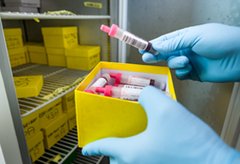2015-06-18
New therapy option for non-small-cell lung cancer

Patients with a specific form of advanced non-small-cell lung cancer (NSCLC) benefit from a therapy with the antibody Nivolumab in comparison with a “classic” chemotherapy. A study on this topic has been published in the renowned New England Journal of Medicine with the collaboration of ARCN partner LungenClinic Grosshansdorf.
Cancer therapies with specific antibodies are of increasing interest. The advantages are obvious: Classic chemotherapeutics which block cell division for instance, have a broad impact on human physiology and therefore often a broad range of side effects. In contrast, antibodies act specifically against their target and have less unwanted influence. The antibody Nivolumab that has been used in a study recently published in the renowned New England Journal of Medicine targets the protein PD-1 (programmed cell death protein 1) that resides on so-called T cells. T cells are part of the immune system and in charge of recognizing non-self or pathological structures. Tumor cells avoid this recognition by expressing the PD-L1 molecule which binds to PD-1 on the T cells and in turn inhibits their function.
Dr. Martin Reck, coordinator of the study at LungenClinic Grosshansdorf says: “This approach of immune therapy is of great interest at present. We use specific antibodies, so-called checkpoint inhibitor antibodies, which act on the tumor-induced inhibition of the immune system and lead subsequently to a ‘reactivation’ of the immune system.”
In this study, patients – who received another therapy earlier and suffered from advanced squamous-cell non-small-cell lung cancer (NSCLC) – were treated with the conventional chemotherapeutic Docetaxel or with the PD-1 antibody Nivolumab, respectively. The survival rate of patients treated with Nivolumab was 41% higher. Moreover, severe adverse events were observed in 7% of the patients, but in 55% treated with a classic chemotherapy. This represents an encouraging advancement, because just a limited number of therapeutic options is available for this kind of lung cancer. Martin Reck, who is co-author of the publication, appraises the study as follows: “In this difficult to treat group of patients with a previously treated, advanced NSCLC, the study is the first in years showing a clear and objective advantage of immunotherapy in direct comparison with chemotherapy in combination with a much better tolerance.”
Interestingly, the authors observed that the effect of the antibody on the squamous-cell tumor was independent of the production of PD-L1 . Therefore, the exact mode of action of the antibody has to be deciphered. Moreover, further studies have to find out which subgroups of patients especially benefit from therapy with PD-1 antibodies. Martin Reck is anticipating new, exciting results on immunotherapy of lung cancer and the impact of PD-1 therapy in case of other patient groups.
Further information: Brahmer J, Reckamp KL, Baas P, Crino L, Eberhardt WE, Poddubskaya E, Antonia S, Pluzanski A, Vokes EE, Holgado E, Waterhouse D, Ready N, Gainor J, Aren Frontera O, Havel L, Steins M, Garassino MC, Aerts JG, Domine M, Paz-Ares L, Reck M, Baudelet C, Harbison CT, Lestini B, Spigel DR (2015) Nivolumab versus Docetaxel in Advanced Squamous-Cell Non-Small-Cell Lung Cancer. N Engl J Med 373: 123-135
/jbul
Calendar
Upcoming events
2024-05-29
74th Meeting of ARCN
2024-06-05
12th DZL Annual Meeting, June 5-7, 2024 (Bad Nauheim)
2024-06-26
